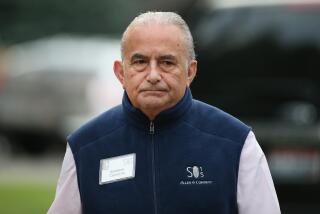Univision and Televisa settle high-stakes lawsuit
- Share via
After years of bad blood and nearly three weeks of court testimony, Mexico’s entertainment giant Grupo Televisa and the dominant Spanish-language TV company in the U.S., Univision Communications Inc., abruptly ended their four-year legal battle Thursday.
The settlement averted a potentially disastrous outcome for Univision, which could have lost its pipeline of Televisa’s popular soap operas, called telenovelas, that drive Univision’s enormous ratings. In turn, Univision agreed to pay Televisa tens of millions of dollars more in royalties.
The agreement came just minutes before Grupo Televisa Chairman Emilio Azcarraga Jean, Mexico’s billionaire media scion, was scheduled to take the stand in an effort to sever his company’s long ties to Univision. Televisa had alleged that Univision had withheld $122 million in royalties that Televisa was rightfully due.
The new deal will enable Univision to continue as the leading Spanish-language media company in the United States. Univision commands about 75% of the Latino audience, and its Los Angeles television outlet, KMEX-TV Channel 34, ranks as the nation’s No. 1 station, beating established ABC, NBC and CBS stations.
“This is good, good for everyone,” a smiling Azcarraga Jean, 40, said as he left the Los Angeles courtroom.
The two companies issued a statement heralding the truce.
“It assures the public that Univision will continue to have access to consistently top-quality Hispanic programming. . . . For Univision, it assures that there will be no disruption in some of its most popular and valuable programming.”
Investors had been monitoring the trial closely. Univision is struggling amid a slowdown in advertising, and it faces looming payments on its $10-billion debt that stem from a highly leveraged buyout two years ago. Losing its supply of low-cost Televisa shows would have been “devastating,” a Univision executive told the jury last week.
Trial testimony included mind-numbing details on how Univision calculated Televisa’s royalties. There were no bombshells. Still, about a dozen people were on hand each day taking notes of the proceedings.
Most of the scribes had been sent by transcription companies hired by large banks and investors that hold Univision debt. As the trial wore on, the price of Univision’s bonds, which have been trading at steep discounts, fluctuated as one side or another appeared in court to gain an advantage.
Several of the note-takers declined to give their name or say who hired them. One 33-year-old Los Angeles man said, “I don’t even know who I’m working for. I’m just here to take notes.”
The settlement came after two days of marathon bargaining sessions led by Los Angeles billionaire Haim Saban, part of an investor group that owns Univision, and Alfonso de Angoitia, executive vice president of Televisa. Saban, Univision’s chairman, attended the trial every day until this week when settlement talks accelerated.
Industry analysts speculated that the two companies sought to resolve their differences rather than risk an unfavorable verdict by the jury. “The stakes were too high,” said Julio Rumbaut, a Spanish-language media consultant.
Televisa sued Univision nearly four years ago, alleging breach of contract. Televisa had sought to bring an early end to its 25-year commitment to supply the telenovelas exclusively to Univision in the U.S., an arrangement that extends through 2017.
As part of the settlement, Univision agreed to pay Televisa $25 million in disputed royalties (although Univision had already paid $21.5 million of that amount “under protest”) and increase the license fees paid to Televisa under its existing deal.
Univision will also provide Televisa with at least $65 million annually in free advertising on Univision’s television networks for the next nine years. Univision typically supplied Televisa with some of its unsold commercial time.
In exchange, Televisa affirmed its commitment to continue to provide telenovelas exclusively to Univision through 2017, removing clouds of uncertainty that had been weighing down the value of Univision’s bonds. Televisa also extended for another year Univision’s right to broadcast matches of the Mexican soccer teams owned by Televisa.
“It was expedient for Univision to pay more money for Televisa’s programming to be able to hold on to that programming through 2017,” Rumbaut said. Now, he said, Univision will have leverage to strike deals with cable companies that might have been reluctant to pay Univision for its channels.
Televisa’s lead attorney, Marshall Grossman, said: “Univision is getting oxygen.”
The dispute between Univision and Televisa is not entirely put to rest, however. The companies are scheduled to have a trial in March to decide whether Univision has the Internet rights to Televisa’s programming.
That case is also expected to settle, people close to the companies said.
--
More to Read
The biggest entertainment stories
Get our big stories about Hollywood, film, television, music, arts, culture and more right in your inbox as soon as they publish.
You may occasionally receive promotional content from the Los Angeles Times.











